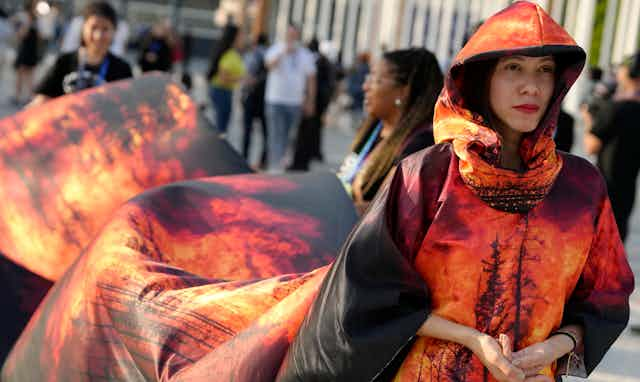How can arts (broadly defined) help us think about the state of the planet and walk the talk when it comes to addressing climate change — including climate finance where those who contributed more to the problem assume greater responsibilities for solving it — and energy transition?
As a theatre scholar and practitioner attending the COP28 climate summit, I was invited to experience a performance of the play Bright Light Burning. Playwright Steven Gaultney authored this play, and it was produced by the Cairo-based, internationally recognized The Theatre of Others. Adam Marple, co-artistic director of this theatre, invited me to the performance.
Marple is also project lead of the Sustainable Theatre Network and a guest on one of my climate change research projects, People, Place and Performance.
The performance Bright Light Burning, in dialogue with my own research and theatre practice, led me to reflect on the role of art in climate change issues.

Bright Light Burning
Bright Light Burning, set in 2100, is a stage performance that is inspired by We Are the Possible, an anthology of 12 poems for 12 days of COP28.
The project takes its name from a Maya Angelou poem. The poetry anthology was a collaboration between scientists, health experts, educators, translators, artists and youth leaders in the United Kingdom and the United Arab Emirates. The project aims “to unite us to forge a greener healthier, and fairer world.”
Bright Light Burning, inspired by this larger poetry endeavour, is a theatrical journey that merges artistry, storytelling and environmental activism. The play presents choices made by individuals in responses to climate change — from denial to activism.
It addresses policymakers on the importance of storytelling in forging new directions. The ensemble comprises actors from different parts of the world — from Singapore to Australia, Egypt to the United States, United Arab Emirates to the United Kingdom.
As different stakeholders continue to enact signed deals, pledges and commitments after COP28, and as communities grapple with the need for political will to implement needed change, who is present or absent at the table is important to achieving an equitable future.
Here are four ideas that could guide interactions, negotiations, thinking and actions around climate justice.
1. Think globally, act locally and personally
Central to the perspectives offered in these performances is the need to decentre a universalist approach to resolving climate issues. We Are The Possible reminds us to start where we are — not out of fear, but hope that humans have the capacity to bring about change. We have to believe in that.
Read more: How to stay hopeful in a world seemingly beyond saving
We need to re-engage place-based and localized solutions, because what works in Latin America may not work in North America.
In my own context in Saskatchewan, theatre artists in have relied on “strategic foresight” to imagine how the theatre we want in the Prairies could help people navigate climate instability while transforming racial injustice. Through such approaches, the capacity of different regions can be built.
2. Embrace alternative ways of knowing
The performances I have seen at COP28 and other theatre projects such as climate change theatre action remind us of the need to return to a relational approach with nature in our existence, and advocate for green theatre.
When we develop habits of seeing ourselves as future ancestors, this means we have to save for the future generation and this means consuming less. This way of seeing and knowing ourselves in relationship to our world in turn affects how we use resources. The performances of Bright Light Burning were designed with a minimalist approach — no prop, set, light or make-up etc. This approach to “greening theatre” has been reiterated by arts practitioners.
Socially engaged theatre is about holding urgent social questions at the centre of our theatre practice. In so doing, as we engage with the UN’s Sustainable Development Goals, questions emerge: What alternative knowledge systems critical to ecological and cultural processes are yet to be known? How can alternative knowledge that has been pushed to the periphery help us think and walk through the polycrisis? In what ways can knowledge from the global majority be amplified?
For instance, prioritizing the perspectives of Indigenous Peoples will require genuine inclusion since it is believed that Indigenous Peoples are stewards of 80 per cent of the world’s biodiversity. Their intergenerational leadership, practices and knowledge in sustainable climate justice need to be recognized for biodiversity to be recovered.
As I saw in my work on theatre and immigration which resulted in the Onion Theatre project, where youth devised a play about immigrant experiences, art can offer us space to foster dialogue to gain insights into ways we can be open to alternative and new ways of knowing — something critical to forging a pathway to an equitable future.

3. Embrace the need for a holistic system approach while fostering equal partnerships that seek to account for inequities, such as class-based and racialized inequities. Holistic system approaches mean that participation in climate change mitigation, anticipatory adaptation and climate justice initiatives should involve equal and genuine partnership and collaboration across geographies. Having a “co-design” mindset is essential to building sustainable systems and solutions.
4. Finally, artists and creative initiatives continue to challenge us to champion climate action. Creatives are invited to think about the impact of their production on health, recovery, peace finance, just transition, gender equality and Indigenous Peoples globally.
All hands must be on deck to walk the talk emerging from COP28, if these conversations are to yield the desired results.

